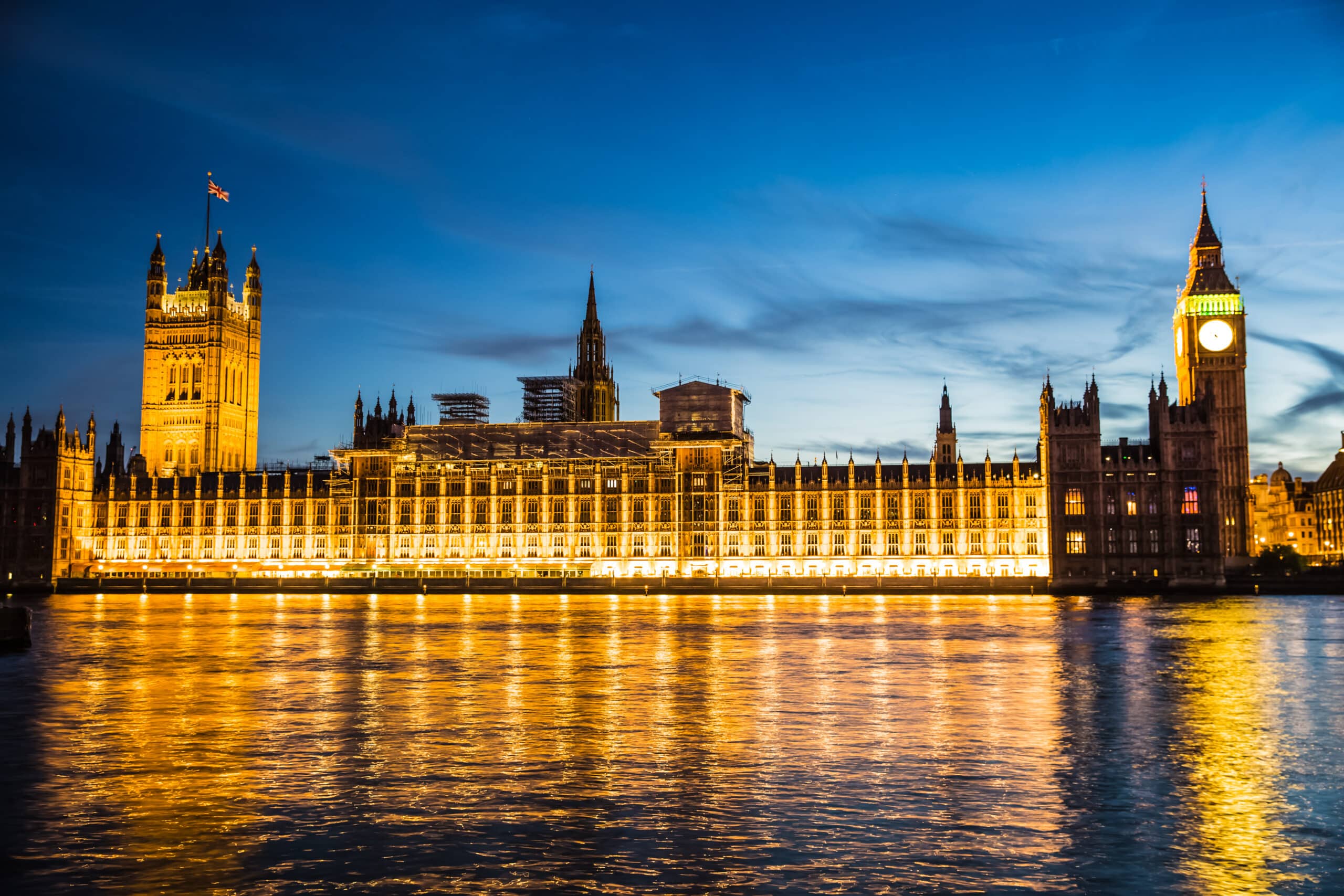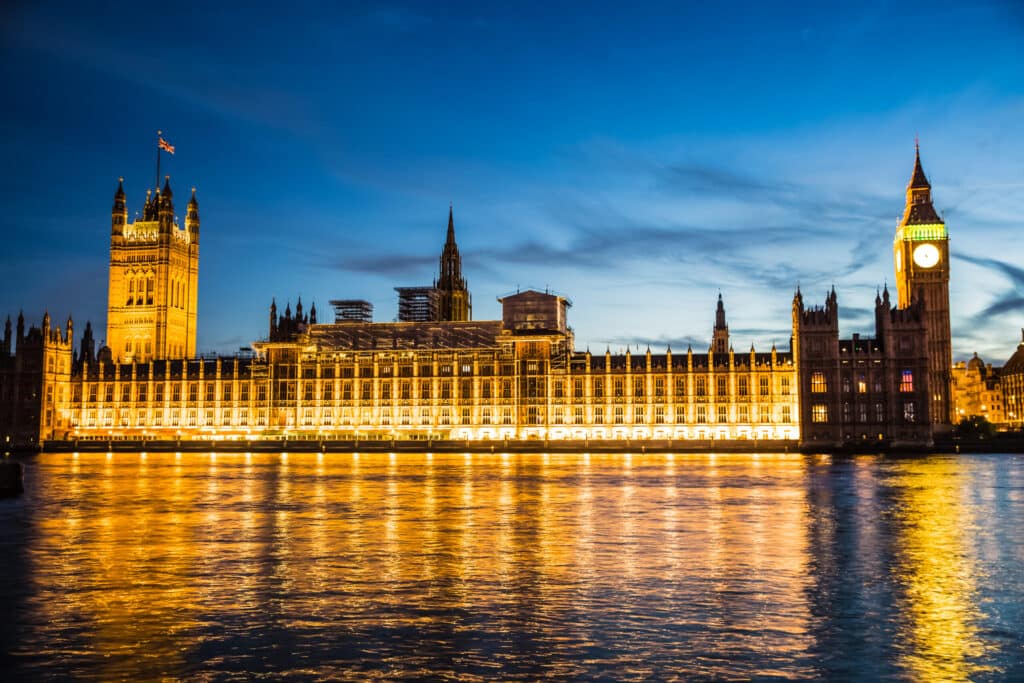Is mandatory social and environmental due diligence coming to the UK?
Business Ethics Debates | read time: 8 min
Published: 9 April 2024

In the week after the European Council finally agreed to progress the Corporate Sustainability Due Diligence Directive (CS3D), GoodCorporation was delighted to welcome business leaders and human right practitioners to the House of Lords to debate a Private Members’ Bill introducing mandatory human rights and environmental due diligence to the UK.
Baroness Young, who proposed the Bill, introduced the debate by reminding guests that some of the most egregious violations of human rights and environmental justice occur within the supply chains of corporations. Cases are routinely coming to light, such as the recent revelations by the New York Times that two leading soft drink manufacturers had been found to have “profited from a brutal system of labor that exploits children and leads to the unnecessary sterilization of working-age women” in the Indian plantations that provide them with sugar.
Expanding on why she felt the Bill was necessary, Baroness Young stated that while most businesses would deplore such actions, and argue that they can address such issues themselves, the evidence would suggest that the voluntary approach has not been sufficient to effect widespread, meaningful change.
Human rights legislation in the UK: has the UK fallen behind?
In the UK, the Modern Slavery Act, despite the introduction of Section 54, has not focussed attention on preventing abuses within supply chains. To address this, the Commercial Organisation and Public Authorities Duty (COPAD) Bill, proposes to place an obligation on companies and public authorities to prevent human rights and environmental harm throughout their operations, subsidiaries and value chains.
Sian Lea, Business and Human Rights Manager at Anti-Slavery International led the debate. She began by reminding us that an estimated 17.3 million people are in forced labour within the global private economy and that almost 4 million are in forced labour imposed by state authorities such as China and Turkmenistan. Research shows that those numbers are on the rise.
Acknowledging the problem, many jurisdictions around the world are introducing and updating their human rights and supply chain legislation, most notably in the EU with the CS3D. We have also seen a number of countries introducing import bans on products made using forced labour.
The UK however, has fallen behind, despite being one of the first leading economies to introduce legislation designed to combat slavery. Widely regarded as a hopeful piece of legislation when it was introduced in 2015, The Modern Slavery Act, with its Transparency in the Supply Chain clause, has failed to bring about any substantial change in practice. Moreover, its focus on reporting, rather than doing, has meant that efforts have been directed towards what to report, rather than what should be done to address problems in the supply chain and wider human rights issues.
Drafted by the Corporate Justice Coalition, the COPAD Bill aims to bring the UK in line with other jurisdictions such as France, Germany and Norway, who have already introduced mandatory supply chain due diligence. It also aligns with the CS3D which should be enacted into law across all EU member states in due course.
Introducing a duty to prevent harm
In line with the UN Guiding Principles, in addition to the obligation to conduct mandatory human rights and environmental due diligence, the COPAD Bill also introduces a duty to prevent harm, holding those in scope liable for any failure to prevent harm, modelled on the liability provisions of the Bribery Act and the Criminal Finances Act. As with the Bribery Act, it is expected that businesses facing prosecution would be required to demonstrate that they had implemented all reasonable procedures to identify, address and prevent these harms from occurring. Through these provisions, the Bill aims to create a level playing field, provide greater clarity on legal obligations and facilitate access to justice for victims.
Access to justice should not be underestimated, with the recent Boohoo case given as an example. In 2020, Boohoo was investigated for minimum wage and health and safety breaches in its UK supply chain. Despite clear evidence that these breaches were occurring, there was no access to justice for the victims and no penalty against Boohoo, just an independent enquiry which concluded that the firm’s monitoring of its factories was inadequate. The COPAD bill would address this, imposing the duty to prevent on the commissioning entity and changing the burden of proof in the victims’ favour.
Much of what is contained in the COPAD Bill aligns with the CS3D, so for those already in scope for this and other similar due diligence requirements, there should be few, if any, additional obligations.
The debate
All agreed that such legislation is needed and welcomed the opportunity to discuss issues raised by the Bill.
Clarity on scope and expectations for supply chain due diligence
The absence of thresholds could be problematic. Establishing criminal liability and bringing about a successful prosecution can be complex in practice. Greater clarity may therefore be needed as to who is in scope and precisely what they are expected to do. This would be particularly important for smaller organisations, not in scope for similar laws in other jurisdictions and who may not have the resources or capacity to meet these new obligations.
For many organisations, the proposed legislation will be an evolution of what they are already doing, but others will need greater clarity, particularly on how far down the supply chain to go. This is a critical issue for businesses with many calling for greater clarity and guidance. With emerging legislation placing increasing obligations on companies for supply chain due diligence, it was felt that a global agreement, possibly based on UNGP definitions, and applied consistently in law, would be extremely helpful.
Those proposing the Bill argue that it will align with the UNGPs and that it should not be about restricting the scope, but directing businesses to identify where the risks lie and address them according to the severity of impact. Prioritisation will be key, and businesses will not be expected to address all risks simultaneously.
Regulatory authority and enforcement
The bill proposes that a regulatory authority provide guidance, specify reporting requirements and enforce compliance, but this will need to be properly resourced if the legislation is to be effective in practice. As with any legislation, ensuring robust enforcement will be critical to its success at driving real change. Businesses would welcome this as it helps focus the minds of senior management to ensure that appropriate resources are allocated to address the areas covered by the legislation. This, in turn, can both change behaviours and help build a level playing field. Commitment to resourcing such a robust regulatory body will be needed at government level if the Bill becomes law.
Downstream risk and accountability
More clarity would be welcomed as to the extent to which an organisation is responsible for how its products are used and who is using them. For many companies, how their product is used is out of their control and can be subject to rapidly changing geo-political situations beyond their sphere of influence.
Ecocide and environmental risks
While the harms caused by environmental degradation and damage are acknowledged, the term ecocide may be a challenge. It is still seen as a controversial term, and while it is increasingly being incorporated into emerging legislation, the burden of proof may be too high to warrant its inclusion in such a bill. This could be examined as the Bill progresses.
Some concerns were raised that the Bill could be spreading itself too thinly by encompassing such a wide range of risks, including issues such as biodiversity. However, it was felt that as the Bill applies to all sectors, it is important to cover all potential environmental risks. This will ensure that organisations focus their efforts on identifying all environmental and human rights risks that apply to their operations in order to prioritise and mitigate appropriately.
Balancing environmental and human rights risks
Although best practice and legislation are both pushing organisations to accept greater responsibility for any environmental and human rights impacts, it will be important to ensure that efforts are not concentrated on mitigating environmental risks. This is an area that many are familiar with as they have been addressing environmental impacts for some time, but this alone will not be sufficient to ensure compliance with COPAD or other emerging legislation such as CS3D. It will also be important to consider the social impact of environmental management strategies, i.e. the impact on factory workers if air conditioning is turned off to reduce emissions.
Under the Bill, organisations will be expected to give equal weight to managing both environmental and human rights risks. This follows the UNGPs, as well as emerging best practice, and is widely regarded as critical to long-term sustainability.
Preventing harm
The overarching aim of the bill is to prevent harm. The failure to prevent offence is therefore critical and should ensure that organisations focus their efforts and resources on doing rather than reporting. Reporting should be ancillary to the efforts being taken to properly identify, mitigate and remedy harms; it should not be a goal in and of itself, but should provide the evidence of the actions being taken to prevent harm. It will therefore be important to ensure that the Bill does not create an additional set of reporting requirements. Businesses would welcome international cooperation on such requirements, ideally creating a global reporting structure aligned to international standards such as the UNGPs.
Collective action and antitrust
With best practice urging companies to work together to use their leverage to bring about change in their supply chains, concerns were raised about the potential for such collective action falling foul of antitrust laws. Some businesses have been warned against taking such action and guidance would be welcomed as to how best to proceed when collaboration is often an effective means of addressing systemic problems that contribute to problematic issues such as low pay.
Finance sector and public authorities
Regarding the finance sector, some concerns were raised that many investors are still asking the wrong questions regarding sustainability and are not probing the extent to which harmful practices are occurring in investee companies. Many businesses would welcome more questions on these areas from investors as that would also help ensure they had the resources needed to address more environmental and human rights harms.
It was also argued that both the finance sector and public authorities may need a delay before coming into scope. From the finance sector perspective, it was argued that time is needed to allow investee companies to act and implement change before finance companies can assess and address what is happening in their value chains. Public authorities, it was acknowledged, have not previously been in scope and as such may need more time to establish the systems and processes needed to comply.
The GoodCorporation view
Many of the businesses we work with will welcome the introduction of such a Bill as it will bring the UK in line with other jurisdictions and help create the level playing field so many want. The aim of preventing harm, supported by a failure to prevent offence, should also help drive a meaningful and sustainable change in behaviour. While the prospect of civil and criminal liability may seem severe, the mandate to prevent harm “as far as reasonably practical” is important. Guidance will be needed as to what is expected, but as with previous laws, it is likely to mean a proportionate and risk-based approach which should align with the objectives of most organisations to operate without harm to people or planet. Many businesses are already working hard to manage and mitigate any negative impacts to meet ESG and human rights requirements and we are supporting their efforts in both these areas. Consequently, we feel such legislation will help support these efforts and should be welcomed.
work with us
